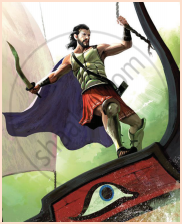Advertisements
Advertisements
प्रश्न
Explain the following line with reference to the context.
It is the tree’s lament, an eerie speech,…
उत्तर
- Reference: These words are from the poem ‘Our Casuarina Tree” written by Torn Dutt.
- Context and Explanation: The poet says these words while explaining the grief experienced by the Casuarina tree in the long spells of her absence. Even when she was as far as in the coasts of Italy and France she could hear the murmur of grief or lament from her tree. It appeared an eerie speech.
APPEARS IN
संबंधित प्रश्न
Who is the narrator in the poem?
How long had the soldiers been in the castle?
Human greed led to the mighty fall of the citadel. Explain.
Read the given line and answer the question that follow in a line or two.
All through the summer at ease we lay,
And daily from the turret wall
We watched the mowers in the hay
- Who does ‘we’ refer to?
- How did the soldiers spend the summer days?
- What could they watch from the turret wall?
Read the given line and answer the question that follow in a line or two.
A foothold there, no clever trick
Could take us dead or quick,
Only a bird could have got in.
- What was challenging?
- Which aspect of the castle’s strength is conveyed by the above line?
How can this shameful tale be told?
I will maintain until my death
Identify the figure of speech used in the following line.
Oh then our maze of tunneled stone
Identify the figure of speech used in the following line.
Our only enemy was gold,
How does the poet spend her winter?
Read the line given below and answer the question that follow.
A creeper climbs, in whose embraces bound No other tree could live.
- Which tree is referred to in the above lines?
- How does the tree survive the tight hold of the creeper?
- Why does Toru Dutt use the expression ‘a creeper climbs’?
How does a man play a lover’s role?
Pick out the word in ‘alliteration’ in the following line.
“Jealous in honour, sudden and quick in quarrel.”
Read the given line and answer the question that follow.
Then the whining school-boy, with his satchel
And shining morning face, creeping like snail
Unwillingly to school.
- Which stage of life is being referred to here by the poet?
- What are the characteristics of this stage?
- How does the boy go to school?
- Which figure of speech has been employed in the second line?
Introduction
The poem ‘Ulysses’ is a dramatic monologue that contains 70 lines of blank verse. Ulysses, the King of Ithaca, gathers his men together to prepare for the journey and exhorts them not to waste their time left on earth. Ulysses has grown old, having experienced many adventures at the battle of Troy and in the seas. After returning to Ithaca, he desires to embark upon his next voyage. His inquisitive spirit is always looking forward to more and more of such adventures.

‘Ulysses is not happy to perform his duties as a king.’ Why?
What could be the possible outcomes of their travel?
Explain with reference to the context the following line.
I cannot rest from travel: I will drink Life to the lees:
What makes Ulysses seek newer adventures?
How would the poet’s advice help his son who is at the threshold of the manhood?
What are the poet’s thoughts on ‘being different’?
The poet says
‘Without rich wanting nothing arrives’ but he condemns ‘the quest of lucre beyond a few easy needs.’ Analyse the difference and write.
How according to the poet is it possible for his son to bring changes into a world that resents change?
What does the phrase ‘full galloping’ suggest?
What did the rider do when he reached Napoleon?
Why did the rider keep his lips compressed?
Read the line given below and answer the question that follow.
Legs wide, arms locked behind As if to balance the prone brow Oppressive with its mind.
- Whose action is described here?
- What is meant by prone brow?
- What is his state of mind?
Explain the following line with reference to the context.
‘I’m killed, Sire!’ And, his Chief beside, Smiling, the boy fell dead.
